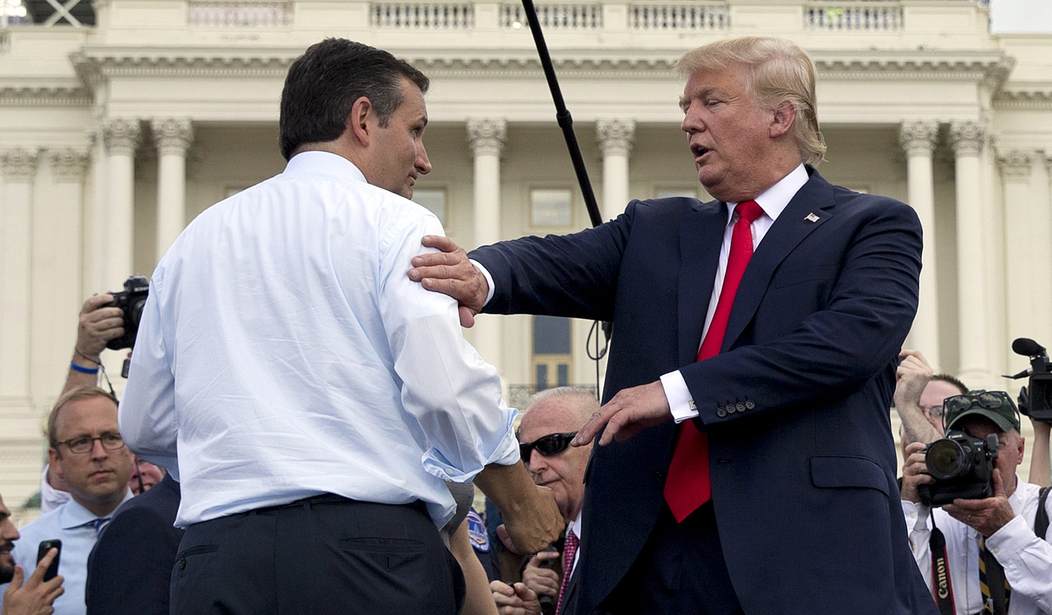Everyone knows the five stages of grief: denial, anger, bargaining, depression and acceptance. Regarding the insurgent candidacy of Donald Trump for the Republican presidential nomination, it looks like we’re somewhere between four and five now:
With Donald Trump marching toward a nomination that few believed he could win, Republicans once bent on defeating him are now reassessing their efforts to stop him.
Trump’s dazed and demoralized adversaries find themselves at a defining moment: After unloading millions of dollars in attack ads aimed at destroying the real estate mogul, after the party’s 2012 nominee delivered a no-holds barred speech targeting him, and after conservatives far and wide spoke out in unrelenting terms about how he could never be president, he’s more dominant than ever — with another rival vanquished, a massive delegate lead and his two remaining opponents looking increasingly like the next to go.
While some Republicans insist on standing firm against the businessman, more and more are contending that it’s time to reach a point of acceptance — and that a drawn-out primary or convention battle could be worse.
“I’m soul-searching right now,” said Penny Nance, president and CEO of Concerned Women for America, who last year explored the possibility of launching an anti-Trump campaign. “There’s still a pathway to defeating him, but it’s getting harder to see that.”
“We’re at a turning point,” conceded Randy Kendrick, wife of Arizona Diamondbacks owner Ken Kendrick and a major contributor to the stop-Trump effort. “It’s a fork in the road — a political fork.”
Well, as Yogi Berra famously said: when you come to a fork in the road, take it. That’s advice some #neverTrumpsters might want to take:
The talks about how to deal with Trump’s ascendance took on fresh urgency on Thursday. Some were intent on keeping up the fight. Prominent conservative activists gathered behind closed doors at the Army-Navy Club in downtown Washington, just a few blocks from the White House, to discuss how Trump could be defeated — even if it means waging a third-party campaign to run against him. The meeting drew around two dozen figures, including prominent activist Erick Erickson, conservative columnist Quin Hillyer, South Dakota businessman Bob Fischer and former George W. Bush adviser Bill Wichterman.
As attendees filtered out of the conference, one said they had agreed that Trump could still be stopped — and that they would do whatever was necessary to make it happen.
“The consensus was that we need a unity ticket of some sort, and we’ll let the candidates work out who the unity ticket is,” Hillyer told POLITICO, floating the possibility of an alliance between Texas Sen. Ted Cruz and Ohio Gov. John Kasich.
Right. That’s a ticket that would struggle to win even the states Romney won last time. A ticket that would diminish turnout, dampen enthusiasm, incite rage on the part of the Trump supporters and hand the White House back to a woman who more properly belongs in jail. Really — what are they thinking?
While the anti-Trump groups have outlined a state-by-state bid to deprive him of the 1,237 delegates he needs to secure the Republican nomination and to force a contested convention in Cleveland — what would be the GOP’s first since 1976 — there’s growing worry that such an event could be traumatic for the party. Trump has said there could be “riots” if he’s denied the nomination — and while many Republicans, including Kasich, have condemned those remarks as inciting violence, many also fear the consequences if he is right.
The way to beat Trump is, was, and always has been, to beat Trump. A euchred convention at this point would be a very, very bad idea.









Join the conversation as a VIP Member